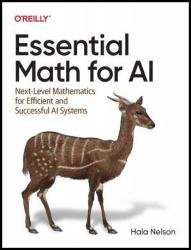Essential Math for AI: Next-Level Mathematics for Efficient and Successful AI Systems (Final Release)
- Добавил: literator
- Дата: 12-02-2023, 03:41
- Комментариев: 0
 Название: Essential Math for AI: Next-Level Mathematics for Efficient and Successful AI Systems (Final Release)
Название: Essential Math for AI: Next-Level Mathematics for Efficient and Successful AI Systems (Final Release)Автор: Hala Nelson
Издательство: O’Reilly Media, Inc.
Год: 2023
Страниц: 605
Язык: английский
Формат: True/Retail PDF EPUB
Размер: 40.8 MB
Companies are scrambling to integrate AI into their systems and operations. But to build truly successful solutions, you need a firm grasp of the underlying mathematics. This accessible guide walks you through the math necessary to thrive in the AI field such as focusing on real-world applications rather than dense academic theory.
Engineers, data scientists, and students alike will examine mathematical topics critical for AI--including regression, neural networks, optimization, backpropagation, convolution, Markov chains, and more--through popular applications such as computer vision, natural language processing, and automated systems. And supplementary Jupyter notebooks shed light on examples with Python code and visualizations. Whether you're just beginning your career or have years of experience, this book gives you the foundation necessary to dive deeper in the field.
AI is built on mathematical models. We need to know how. I wrote this book in purely colloquial language, leaving most of the technical details out. It is a math book about AI, however, with very few mathematical formulas and equations, no theorems, no proofs, and no coding. My goal is not to keep this important knowledge in the hands of very few elite, and to attract more people to technical fields. I believe that many people get turned off by math before they ever get a chance to know that they might love it and be naturally good at it.
The most beautiful thing about math is that it has the expressive ability to connect seemingly disparate things together. A field as big and as consequential as AI not only builds on math, as that is a given; it also needs the binding ability that only math can provide in order to tell its big story concisely. In this book I will extract the math required for AI in a way that does not deviate at all from the real-life AI application in mind. It is infeasible to go through existing tools in detail and not fall into an encyclopedic and overwhelming treatment. What I do instead is try to teach you how to think about these tools and view them from above, as a means to an end that we can tweak and adjust when we need to. I hope that you will get out of this book a way of seeing how things relate to each other and why we develop or use certain methods among others. In a way, this book provides a platform that launches you to whatever area you find interesting or want to specialize in.
Another goal of this book is to democratize mathematics, and to build more confidence to ask about how things work. Common answers such as “It’s complicated mathematics,” “It’s complicated technology,” or “It’s complex models,” are no longer satisfying, especially since the technologies that build on mathematical models currently affect every aspect of our lives. We do not need to be experts in every field in mathematics (no one is) in order to understand how things are built and why they operate the way they do. There is one thing about mathematical models that everyone needs to know: they always give an answer. They always spit out a number. A model that is vetted, validated, and backed with sound theory gives an answer. Also, a model that is complete trash gives an answer. Both compute mathematical functions. Saying that our decisions are based on mathematical models and algorithms does not make them sacred. What are the models built on? What are their assumptions? Limitations? Data they were trained on? Tested on? What variables did they take into account? And what did they leave out? Do they have a feedback loop for improvement, ground truths to compare to and improve on? Is there any theory backing them up? We need to be transparent with this information when the models are ours, and ask for it when the models are deciding our livelihoods for us.
Texts on Artificial Intelligence are usually either technical manuscripts written by experts for other experts, or cursory, math-free introductions catered to general audiences. This book takes a refreshing third path by introducing the mathematical foundations for readers in business, data, and similar fields without advanced mathematics degrees. The author weaves elegant equations and pithy observations throughout, all the while asking the reader to consider the very serious implications artificial intelligence has on society. I recommend Essential Math for AI to anyone looking for a rigorous treatment of AI fundamentals viewed through a practical lens. - George Mount, Data Analyst and Educator
Скачать Essential Math for AI (Final Release)
Внимание
Уважаемый посетитель, Вы зашли на сайт как незарегистрированный пользователь.
Мы рекомендуем Вам зарегистрироваться либо войти на сайт под своим именем.
Уважаемый посетитель, Вы зашли на сайт как незарегистрированный пользователь.
Мы рекомендуем Вам зарегистрироваться либо войти на сайт под своим именем.
Информация
Посетители, находящиеся в группе Гости, не могут оставлять комментарии к данной публикации.
Посетители, находящиеся в группе Гости, не могут оставлять комментарии к данной публикации.
